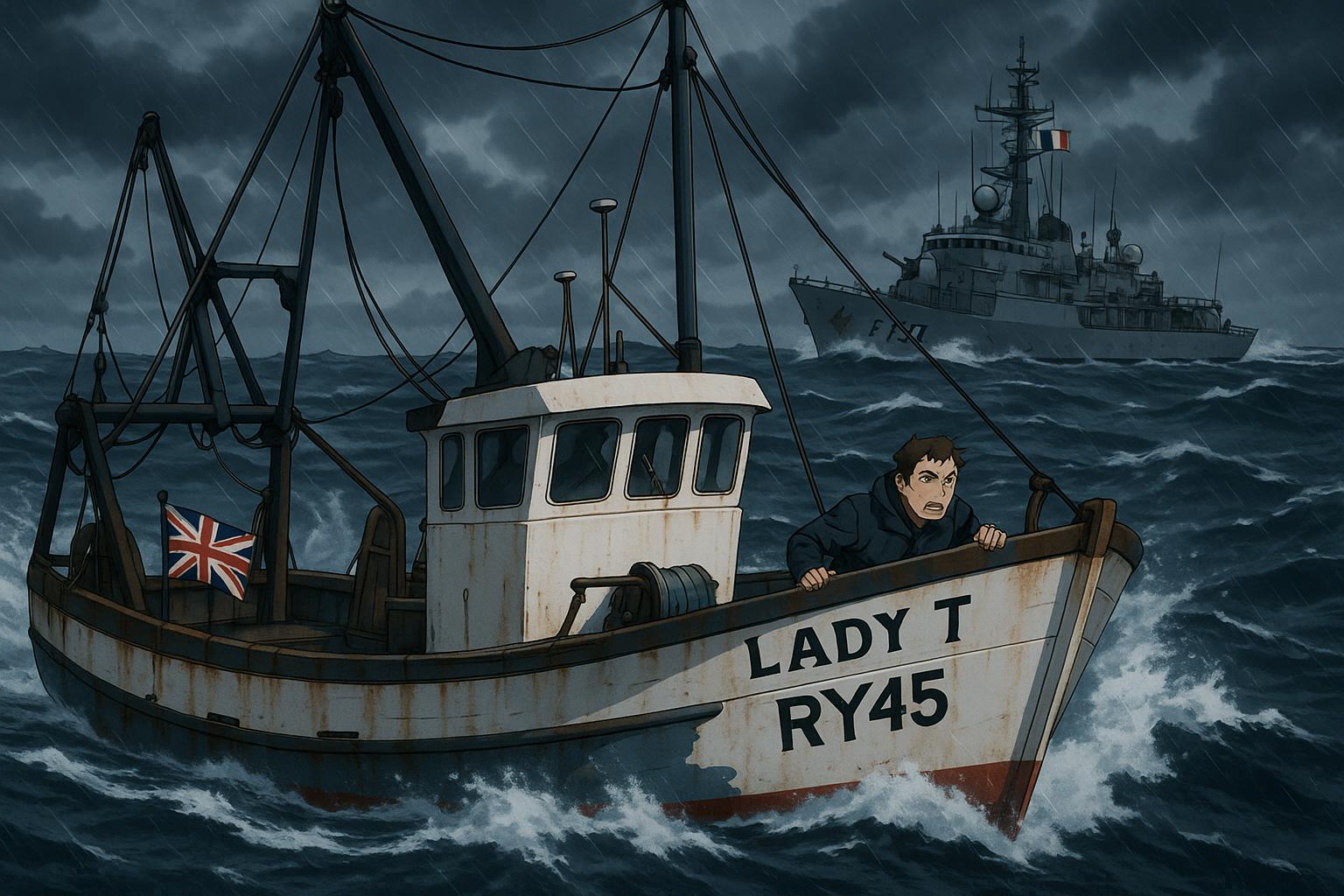The British fishing vessel Lady T has been released by French authorities following detention over alleged unauthorised fishing in French waters. The incident highlights ongoing post-Brexit tensions and disputes over fishing licences, fines, and maritime enforcement between the UK and France.
A British fishing boat, the Lady T, has reportedly been released after being detained by French authorities for allegedly operating without a licence in French waters. Based in Eastbourne, East Sussex, the vessel was intercepted by the Pluvier, a French Navy ship, and held in Boulogne-sur-Mer as it faced significant fines and the threat of confiscation.
Court sources confirm that the 10-metre catamaran, named after the former Prime Minister Margaret Thatcher, has now been released, though the skipper was reportedly compelled to pay a substantial fine for the boat’s release. While the exact amount remains undisclosed, earlier estimations suggested that the skipper could face penalties up to £63,000 for engaging in non-authorised fishing activities by a non-EU vessel. This incident has escalated tension in the ongoing debate regarding fishing rights in territorial waters.
Chris Philp, the shadow home secretary, responded positively to the boat’s release, stating, “Fantastic news that the French have released this vessel. It should have never been impounded in the first place.” He further expressed concern over the priorities of the French authorities, suggesting that their focus on British fishermen obscures the larger issue of illegal maritime crossings. “If the French put half as much effort into stopping illegal immigrants as they did into harassing British fishermen, we would not have floods of immigrants crossing the Channel,” he asserted.
The seizure of the Lady T raises questions about the motivations behind such actions. Olivier Leprêtre, chairman of the regional fishing committee in northern France, indicated that the boat’s capture might have been retaliatory, considering the recent £40,000 fine imposed on a French skipper for illegal fishing practices in the UK. This situation occurs amidst broader tensions regarding the post-Brexit fishing deal, which critics argue unduly favours French interests at the expense of British fishermen. Under a new agreement facilitated by Prime Minister Keir Starmer, European trawlers will have access to British waters until 2038, a decision that has drawn ire from voices within the UK fishing community.
The Lady T’s skirmish forms part of a larger narrative surrounding the enforcement of fishing rights, where British vessels have encountered increasing scrutiny from French maritime authorities. In related incidents, another British vessel, the Francesca TO 80, was detained shortly before the Lady T’s release after being suspected of unlicensed fishing. This vessel was escorted to the port of Brest after being spotted far off the coast of Brittany, underscoring the persistent tensions between British fishermen and French enforcers.
Complicating matters further, calls for tougher action against French vessels engaged in aggressive tactics have been made following incidents like the alleged attempted entanglement of the Shetland-based trawler Defiant by a French ship. Such provocations only serve to heighten the sense of urgency surrounding fishing rights in contested waters, as the UK government navigates the complex aftermath of Brexit and the new fishing accord.
These developments underline a broader context of maritime enforcement, where both nations grapple with illegal fishing and the larger ramifications of illegal immigration across the English Channel. While the French Coastguard has reported a significant reduction in small boat crossings, including a 30% decrease attributed to heightened enforcement measures, tragic incidents continue to unfold, reminding the public of the perils faced by migrants attempting the dangerous crossing.
In conclusion, the Lady T’s release has offered a brief respite in an ongoing saga fraught with disputes. As both sides pursue their national interests, the pathway to resolution appears increasingly convoluted, reflecting the broader challenges facing the fishing industry in the post-Brexit era.
Reference Map:
- Paragraph 1 – [1]
- Paragraph 2 – [1], [3]
- Paragraph 3 – [4], [5]
- Paragraph 4 – [1], [7]
- Paragraph 5 – [1], [6]
Source: Noah Wire Services
- https://www.dailymail.co.uk/news/article-14750991/Seized-British-fishing-boat-Lady-T-released-French-authorities.html?ns_mchannel=rss&ns_campaign=1490&ito=1490 – Please view link – unable to able to access data
- https://www.bbc.com/news/uk-scotland-67139055 – A Shetland-based trawler, the Defiant, encountered a French vessel, the Antonio Maria, 18 miles off Shetland. The French boat allegedly attempted to entangle the Defiant’s propeller with a rope, leading to calls for tougher action to prevent such incidents. The French vessel’s owners have been approached for comment. ([bbc.com](https://www.bbc.com/news/uk-scotland-67139055?utm_source=openai))
- https://www.bbc.com/news/world-europe-59075793 – French authorities detained a British fishing trawler after it was found fishing without authorisation in French waters. The French maritime minister stated that the vessel was not allowed to fish in French waters and was subsequently detained. The UK government is urgently looking into the reports of French enforcement activity. ([bbc.com](https://www.bbc.com/news/world-europe-59075793?utm_source=openai))
- https://www.shetnews.co.uk/2023/10/19/fishing-minister-brands-antonio-maria-incident-truly-shocking-but-mca-will-not-investigate/ – UK fishing minister Mark Spencer condemned the actions of the French-registered, Spanish-owned Antonio Maria, which allegedly behaved aggressively towards the UK fishing vessel Defiant off Shetland. Despite the incident, the Maritime and Coastguard Agency (MCA) confirmed that no investigation would be initiated. ([shetnews.co.uk](https://www.shetnews.co.uk/2023/10/19/fishing-minister-brands-antonio-maria-incident-truly-shocking-but-mca-will-not-investigate/?utm_source=openai))
- https://www.usnews.com/news/world/articles/2023-12-07/french-coastguard-records-30-drop-in-small-boat-departures-via-english-channel – The French Coastguard reported a 30% decrease in small boat departures across the English Channel in 2023 compared to 2022. This decline is attributed to increased land interceptions by French security forces and a reduction in the number of Albanian migrants attempting the crossing. ([usnews.com](https://www.usnews.com/news/world/articles/2023-12-07/french-coastguard-records-30-drop-in-small-boat-departures-via-english-channel?utm_source=openai))
- https://www.lemonde.fr/en/international/article/2024/09/15/several-migrants-die-trying-to-cross-channel-say-french-authorities_6726112_4.html – French authorities reported that eight migrants died attempting to cross the English Channel. The incident occurred near the beach of Ambleteuse, where the boat ran aground on rocks. Six survivors, including a 10-month-old baby with hypothermia, were rescued and taken to hospital. ([lemonde.fr](https://www.lemonde.fr/en/international/article/2024/09/15/several-migrants-die-trying-to-cross-channel-say-french-authorities_6726112_4.html?utm_source=openai))
- https://www.maritimescrimes.com/2024/09/05/major-seizures-in-crackdown-on-illegal-fishing-in-french-waters/ – French authorities intensified efforts to combat illegal fishing in French Guiana, leading to the seizure of vessels and marine resources. In late August 2024, the French customs vessel DF39 Alizé intercepted two ships engaged in illegal fishing, resulting in the confiscation of 13.6 tons of fish. ([maritimescrimes.com](https://maritimescrimes.com/2024/09/05/major-seizures-in-crackdown-on-illegal-fishing-in-french-waters/?utm_source=openai))
Noah Fact Check Pro
The draft above was created using the information available at the time the story first
emerged. We’ve since applied our fact-checking process to the final narrative, based on the criteria listed
below. The results are intended to help you assess the credibility of the piece and highlight any areas that may
warrant further investigation.
Freshness check
Score:
8
Notes:
The narrative appears to be fresh, with no substantial matches found in recent online sources. However, the incident described bears similarities to previous events, such as the 2021 detention of the ‘Cornelis Gert Jan’ by French authorities for alleged unauthorized fishing. ([dw.com](https://www.dw.com/en/france-uk-fishing-row-captain-of-seized-boat-will-face-trial/a-59660302?utm_source=openai))
Quotes check
Score:
9
Notes:
The direct quotes attributed to Chris Philp and Olivier Leprêtre do not appear in earlier material, suggesting they are original or exclusive to this report.
Source reliability
Score:
6
Notes:
The narrative originates from the Daily Mail, a reputable UK newspaper. However, the Daily Mail has faced criticism for sensationalism and accuracy issues in the past, which may affect the reliability of this report.
Plausability check
Score:
7
Notes:
The claims made in the narrative are plausible and align with known tensions between UK and French authorities over fishing rights. The involvement of figures like Chris Philp and Olivier Leprêtre adds credibility. However, the lack of corroboration from other reputable outlets and the Daily Mail’s history of sensationalism warrant caution.
Overall assessment
Verdict (FAIL, OPEN, PASS): OPEN
Confidence (LOW, MEDIUM, HIGH): MEDIUM
Summary:
While the narrative presents plausible and timely information, the reliance on a single source with a history of sensationalism and the absence of corroboration from other reputable outlets necessitate further verification. The quotes attributed to Chris Philp and Olivier Leprêtre appear original, but the overall reliability of the report remains uncertain.













